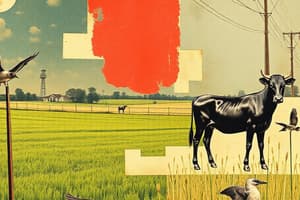Podcast
Questions and Answers
What was a key requirement for candidates aiming to join the community in 1970?
What was a key requirement for candidates aiming to join the community in 1970?
- Uniformity in production methods
- Solidarity in financing the agricultural market (correct)
- Acceptance of a long transition period
- Prior experience in agricultural policies
Which aspect did Pompidou emphasize during the negotiations with the UK?
Which aspect did Pompidou emphasize during the negotiations with the UK?
- Bilateral agreements between member states
- Council leadership in negotiations (correct)
- Extending the negotiation timeline
- The need for a uniform price structure
What was Ted Heath's primary focus during the negotiations with the French government?
What was Ted Heath's primary focus during the negotiations with the French government?
- Negotiating for a longer transition period (correct)
- Building relationships with Denmark and Norway
- Achieving a quick resolution
- Aligning UK agricultural policies with EU standards
How did Pompidou characterize the British people in his January 1971 statement?
How did Pompidou characterize the British people in his January 1971 statement?
What was one of the most challenging points in the negotiations?
What was one of the most challenging points in the negotiations?
What was a key factor driving the need for a common currency and economic union after Nixon's announcement?
What was a key factor driving the need for a common currency and economic union after Nixon's announcement?
What requirement did new candidates face for becoming full members of the EEC?
What requirement did new candidates face for becoming full members of the EEC?
Why was the acceptance of the common agricultural policy complicated for the UK?
Why was the acceptance of the common agricultural policy complicated for the UK?
What was the significance of the Hague Conference concerning the UK's entry into the EEC?
What was the significance of the Hague Conference concerning the UK's entry into the EEC?
What was one of Thatcher's perspectives on spending in relation to agricultural imports?
What was one of Thatcher's perspectives on spending in relation to agricultural imports?
What was one reason Wilson believed joining the EEC could benefit Britain?
What was one reason Wilson believed joining the EEC could benefit Britain?
What alternative did D.G. suggest in response to Wilson's application for EEC membership?
What alternative did D.G. suggest in response to Wilson's application for EEC membership?
Which of the following concepts was emerging in the mid-60s regarding European integration?
Which of the following concepts was emerging in the mid-60s regarding European integration?
According to the discussion, why did Wilson change his mind about applying to join the EEC?
According to the discussion, why did Wilson change his mind about applying to join the EEC?
What was D.G.'s concern regarding the potential UK membership in the EEC?
What was D.G.'s concern regarding the potential UK membership in the EEC?
What was the significance of Spain's entry into the EEC in relation to Francoism?
What was the significance of Spain's entry into the EEC in relation to Francoism?
What was the 'rupture pactada' associated with the political reforms in Spain during the late 1970s?
What was the 'rupture pactada' associated with the political reforms in Spain during the late 1970s?
Which French president imposed a veto on Spain's entry into the EEC, specifically regarding agricultural concerns?
Which French president imposed a veto on Spain's entry into the EEC, specifically regarding agricultural concerns?
Why did Juan Carlos I's selection as king reflect Francoism?
Why did Juan Carlos I's selection as king reflect Francoism?
Which political reform was voted by the Francoist parliament in 1976?
Which political reform was voted by the Francoist parliament in 1976?
What led to the collapse of the colonners regime in Greece in July 1974?
What led to the collapse of the colonners regime in Greece in July 1974?
What significant political change occurred in Spain following Franco's death in 1975?
What significant political change occurred in Spain following Franco's death in 1975?
What was a major condition for Greece, Portugal, and Spain to apply for full membership in the EEC?
What was a major condition for Greece, Portugal, and Spain to apply for full membership in the EEC?
What was the status of Greece's NATO membership in relation to its entry into the EEC?
What was the status of Greece's NATO membership in relation to its entry into the EEC?
How did Franco's regime affect Spain's initial application to the EEC in 1962?
How did Franco's regime affect Spain's initial application to the EEC in 1962?
What was a key issue that complicated Greece's NATO membership concerning Cyprus?
What was a key issue that complicated Greece's NATO membership concerning Cyprus?
What was the outcome for Portugal regarding EEC membership during the dictatorship?
What was the outcome for Portugal regarding EEC membership during the dictatorship?
Upon returning to Greece, what significant step did Karamanlis take?
Upon returning to Greece, what significant step did Karamanlis take?
What was George Pompidou's stance on British membership in the EEC?
What was George Pompidou's stance on British membership in the EEC?
Which of the following points were identified as part of the relaunch before British enlargement?
Which of the following points were identified as part of the relaunch before British enlargement?
What were the proposals held at The Hague Conference intended to achieve?
What were the proposals held at The Hague Conference intended to achieve?
What did the new approach towards British EEC membership signify for France’s stance?
What did the new approach towards British EEC membership signify for France’s stance?
What was one reason De Gaulle failed to support British membership in the EEC?
What was one reason De Gaulle failed to support British membership in the EEC?
What change in perception about UK membership was expected from France under Pompidou?
What change in perception about UK membership was expected from France under Pompidou?
What characterized the difference between the first and second French veto concerning UK membership?
What characterized the difference between the first and second French veto concerning UK membership?
What was the overarching goal of European countries regarding the UK’s membership prior to Pompidou's leadership?
What was the overarching goal of European countries regarding the UK’s membership prior to Pompidou's leadership?
Flashcards
Wilson's 1966 EEC Application
Wilson's 1966 EEC Application
Harold Wilson's government officially announced its intention to join the EEC, but only if it protected key British and Commonwealth interests.
Wilson's Economic Motivations for EEC
Wilson's Economic Motivations for EEC
Wilson's primary motivation was the potential for economic growth through access to the common market, which he believed would revive the British economy.
Wilson's EEC for European Power
Wilson's EEC for European Power
Wilson saw EEC membership as a way to counter the dominance of the United States in technology and create a European power bloc.
De Gaulle's Veto of British EEC Application
De Gaulle's Veto of British EEC Application
Signup and view all the flashcards
France's Alternatives to Full EEC Membership
France's Alternatives to Full EEC Membership
Signup and view all the flashcards
Gaullist phase
Gaullist phase
Signup and view all the flashcards
Gaullist approach
Gaullist approach
Signup and view all the flashcards
The Hague Conference (1969)
The Hague Conference (1969)
Signup and view all the flashcards
Widening (EEC)
Widening (EEC)
Signup and view all the flashcards
Deepening (EEC)
Deepening (EEC)
Signup and view all the flashcards
Completion (EEC)
Completion (EEC)
Signup and view all the flashcards
UK membership as a strategic necessity
UK membership as a strategic necessity
Signup and view all the flashcards
Relaunch of European integration
Relaunch of European integration
Signup and view all the flashcards
Council's Role in EEC Negotiations
Council's Role in EEC Negotiations
Signup and view all the flashcards
Commission's Limited Role during Negotiations
Commission's Limited Role during Negotiations
Signup and view all the flashcards
Transition Period Debate
Transition Period Debate
Signup and view all the flashcards
Solidarity in Agricultural Market
Solidarity in Agricultural Market
Signup and view all the flashcards
Heath's Transition Period Priority
Heath's Transition Period Priority
Signup and view all the flashcards
What is the 'acquis communautaire'?
What is the 'acquis communautaire'?
Signup and view all the flashcards
How does the 'acquis communautaire' affect EU expansion?
How does the 'acquis communautaire' affect EU expansion?
Signup and view all the flashcards
Why was the common agricultural policy a challenge for the UK?
Why was the common agricultural policy a challenge for the UK?
Signup and view all the flashcards
What was the significance of the Hague Conference?
What was the significance of the Hague Conference?
Signup and view all the flashcards
How did Margaret Thatcher view the UK's role in the EEC?
How did Margaret Thatcher view the UK's role in the EEC?
Signup and view all the flashcards
Significance of Spanish Democracy on EEC Membership
Significance of Spanish Democracy on EEC Membership
Signup and view all the flashcards
Law for Political Reform: A Step Towards Spanish Democracy
Law for Political Reform: A Step Towards Spanish Democracy
Signup and view all the flashcards
Juan Carlos I: Architect of Democracy
Juan Carlos I: Architect of Democracy
Signup and view all the flashcards
Suarez: Leading the Transition
Suarez: Leading the Transition
Signup and view all the flashcards
EEC Membership: Legitimizing Democracy
EEC Membership: Legitimizing Democracy
Signup and view all the flashcards
Cyprus Conflict and Turkish EU Membership
Cyprus Conflict and Turkish EU Membership
Signup and view all the flashcards
Karamanlis' Return and Democratic Transition
Karamanlis' Return and Democratic Transition
Signup and view all the flashcards
Franco's Succession and Spain's Transition
Franco's Succession and Spain's Transition
Signup and view all the flashcards
End of Dictatorships and EEC Membership
End of Dictatorships and EEC Membership
Signup and view all the flashcards
NATO and Europe before EEC Applications
NATO and Europe before EEC Applications
Signup and view all the flashcards
Greece's Frozen Association and Democracy
Greece's Frozen Association and Democracy
Signup and view all the flashcards
Spain's Delayed Association and Franco's Regime
Spain's Delayed Association and Franco's Regime
Signup and view all the flashcards
Greece's EEC Application
Greece's EEC Application
Signup and view all the flashcards
Study Notes
Recap of Previous Lecture
-
Completion of the common agricultural policy (CAP) is a key aspect of the European Economic Community (EEC)
-
Each country contributed to the budget, which was primarily used to support agricultural sectors. Notably, France’s agricultural sector was large at the time.
-
West Germany contributed to the EEC budget despite its comparatively smaller agricultural sector.
-
The UK joining the EEC was problematic due to differences in agricultural policies and budget contributions.
-
The UK had to pay into the CAP, but didn’t have a large agricultural sector like other member countries.
-
The UK’s contribution to the EEC budget was a significant issue in negotiations during the 1970s.
Studying That Suits You
Use AI to generate personalized quizzes and flashcards to suit your learning preferences.




